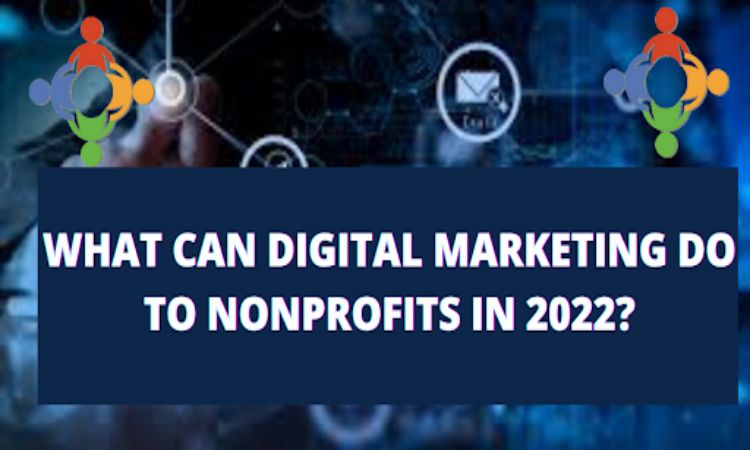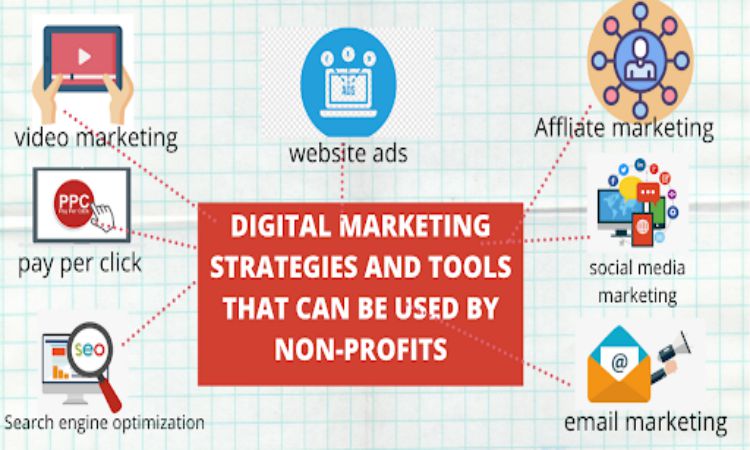 Nonprofits exist to serve people. Nonprofits strive to attract supporters, volunteers, and donors by providing awareness about their mission, vision, and goals. Digital strategy for nonprofits involves the use of tools like search engine optimization (SEO), online ads, and social media marketing.
Nonprofits exist to serve people. Nonprofits strive to attract supporters, volunteers, and donors by providing awareness about their mission, vision, and goals. Digital strategy for nonprofits involves the use of tools like search engine optimization (SEO), online ads, and social media marketing.
These tools help nonprofits achieve their goals. Like many small businesses, nonprofit organizations play vital roles in building successful communities by contributing to the economy. This article discusses what digital marketing does to nonprofits in 2022.
What Is Digital Marketing?
Digital marketing is a type of marketing that connects brands and products with potential customers through social media, website advertisements, email, and other marketing channels. It involves digital communication between organizations and customers.
It also helps nonprofit marketing by connecting nonprofits with donors and sponsors. Further, a digital marketing strategy is a plan that outlines how a business can achieve efficient marketing. This is through various online channels like social media and search engines. It summarizes the required channels and digital marketing tactics you should use. This plan also involves the positive impacts of these channels and tactics which help drive the business forward.
How to Create an Effective Digital Strategy
- State brand goals and objectives.
- Evaluate the current marketing presence.
- Identify target customers or sponsors: It is important to identify the type of customers or sponsors the business intends to attract with a digital marketing strategy.
- Choose digital tools or strategies.
- Determine the budget: The budget contains the capital and all the expenditures that are needed to create the digital strategy.
- Create a workflow plan: A nonprofit marketing plan contains the lifecycle of how the digital strategy will be executed starting from the first to last stage.
- Launch campaigns: This stage involves launching campaigns across different channels and ensuring different channels have the required tracking information.
- Analyze results: It is important to monitor and measure the digital strategies by tracking performance. Tools like Google Analytics can be used. The results of the different launched campaigns should also be analyzed.
Digital Marketing Strategies and Tools That Can be Used by Nonprofits

- Search Engine Optimization (SEO): Search engine optimization is one way to launch a digital strategy for nonprofits. Proper SEO ensures that the nonprofit’s website has a competitive advantage by ranking it as high as possible on different search engines. Examples of some SEO tools are Google search content, Spyfu, and Ahrefs.
- Email marketing: Email marketing is a marketing strategy for nonprofits, which attracts sponsors through emails that can be applied by nonprofit organizations.
- Social media marketing and website ads. Social media is one of the best digital marketing strategies for nonprofits. It improves marketing for nonprofits, they can easily utilize social media like Facebook, Instagram, WhatsApp. Etc. Website advertisements can also be used.
- Affiliate marketing: Affiliate marketing involves employing the use of third parties to help promote the nonprofit organization. Digital marketing agencies for nonprofits can be used for affiliate marketing.
- Video marketing: Another digital strategy for nonprofits that can be adopted is video marketing which involves recording video content.
- Pay-per-click (PPC): it involves putting ads on high-quality sites and paying for the clicks.
Impacts of Digital Marketing on Nonprofits
1. It Increases Website Traffic
Digital strategies for nonprofits like SEO can help drive traffic to nonprofits’ websites which in turn increases the online presence. Online presence for nonprofits helps to improve the quality of the organization and allows them to easily achieve their goals.
Having a strong online presence also helps these organizations build their credibility. Being seen as a trustworthy and credible organization can open a lot of new doors for nonprofit groups. Ultimately, they attract new interested individuals such as donors and volunteers.
2. Increase Supporters and Encourages Donors
Digital marketing helps publicize a nonprofit’s operations to a wider audience which then increases support for the nonprofit. To attract donors, nonprofits can use digital strategies like search engine optimization to rank high on search engines such as Google.
In addition, well-planned digital marketing strategies create successful events such as fundraisers. Fundraisers for nonprofits is a process in which funds are collected from different individuals through donations and crowdfunding.
Digital marketing has been proven to help nonprofits organize successful fundraisers through strategies like video marketing which shows content related to the purpose of the fundraising. Take, for example, UNICEF. They organized a video showing fewer privileged children which helped achieve their fundraising figures.
3. Promotes Sponsorship
Sponsorship is very important in nonprofits. Sponsorship helps support nonprofit activities, special events, or programs by publicizing or supporting them with funds. Sponsorships also enable organizations to attract customers and improve their reputation. Digital marketing has enabled nonprofits to attract sponsorships from various high-ranking individuals through online advertising and publications.
4. Helps Create Awareness
Digital marketing can make nonprofits have a global audience by removing limitations. Non-profit marketing can make people aware of the nonprofit’s goals. Online advertisements can also help promote nonprofit activities.
5. It Improves Transparency in Nonprofits
Transparency in nonprofits is the availability of information about the financial position and the governance of a nonprofit. Nonprofits have to disclose their financial decisions and ensure board meetings are as transparent as possible to build trust. Digital marketing strategies like social media marketing ensure that the operations of nonprofits are well-publicized.
6. Allows Nonprofits to Achieve Its Goals
Nonprofits provide critical services to society. Digital marketing strategies help nonprofits provide essential services to the population by providing the necessary methods for them to spread their cause. For example, online advertisements can be seen by a multitude of people all over the internet.
Conclusion
Nonprofits have to ensure they use efficient methods to engage their supporters and donors. This can help these nonprofit organizations to keep growing and materialize their goals further.
This article explained the several positive impacts of digital marketing on nonprofits such as increasing a nonprofit’s online presence, attracting more donors and volunteers, promoting transparency, and many others. Digital strategies like SEO marketing, social media marketing, video marketing, affiliate marketing, pay-per-click, etc can help achieve these.











